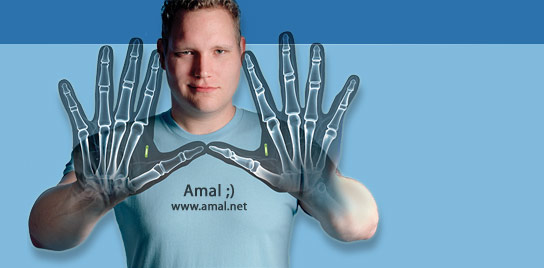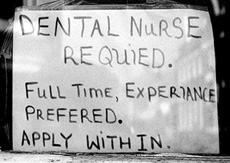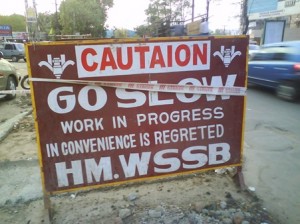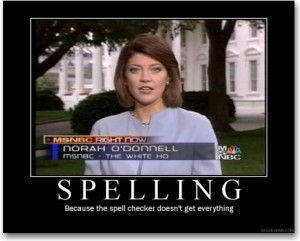Some people think when a word is spelled correctly but used incorrectly, that is a spelling mistake. I disagree. If a person intended to use a different word, but through a spelling misstep used another word which happens to be spelled correctly, that is a grammar mistake my friend.
Take this example; We passed a truck the other day and snapped this photo. The word used is breath, but the correct word is breathe. This is not a spelling mistake, this is a grammar mistake.
The same holds true when someone means to type “I liked the concert” but instead types “I licked the concert”. Because the word “licked” is spelled correctly, the mistake defaults to a grammar error when read by a third party. The author knows the intent and may consider it a spelling mistake, but to a reader who can only guess at the meaning based on context, it is a grammar issue.
The following example contains several spelling errors; “requied” and “experiance” and arguably “prefered”, however the plasticity of the English language is making this a weak argument.
This sign has a trick in it. The incorrectly spelled words are “cautaion” and “regreted”, but surprisingly “in convenience” is not because both words are astonishingly spelled correctly… just grammatically idiotic.
Now, the following is not a spelling mistake. It is a grammar mistake pure and simple.

















Ahh… The White Ho… classic 😉
No. It is a spelling mistake because “you can breath easy” is nonsense.
I disagree. The word is spelled correctly, just used incorrectly. That is a grammar issue no? It’s like “I can has cheeseburgers?” – all the words are spelled correctly, but grammatically it’s utter nonsense. To further this point, correcting for improper grammar would result in “Can I have cheeseburgers?” and I don’t think anyone would argue that the incorrect tense on has vs have is not a grammar issue… hence the entire sentence is a grammatical nightmare created using perfectly spelled words.
Using the above definition, we see that the structure of the sentence uses correctly spelled words, but the structure itself is wrong – specifically syntax. Now let’s look at the definition of syntax.
Now it should be clear that the improper use of properly spelled words in the structure of a sentence is a grammar issue. If the word(s) used in the sentence are spelled incorrectly (i.e. not actual words), then the implied grammar, correct or not, really becomes irrelevant. For example; “I have a cell fone for sale.” – The word fone is spelled incorrectly, but we can infer the intended word and the sentance still makes sense to us. If, however, the sentence was “I have a jump for sale.” we can clearly see the word jump is a correctly spelled verb, which makes this a grammar error. The same can be said for the “You can breath easy” example detailed in this post.
The flaw of your logic is that you believe it’s a mistake with grammar just because their misspelled word happens to be a valid word. If i misspelled ”cow” as ”cowl” for example, it then becomes a grammar error? As opposed to if I misspelled it as “coww” then it’s a spelling error? No, a word misspelled is a word misspelled, even if by chance it happens to be real word.
Peter, I think we’re both wrong. When I look at the definition of grammar, I see several variances on the same theme, which is to say this;
Grammar – a device, as a body of rules, whose output is all of the sentences that are permissible in a given language, while excluding all those that are not permissible.
The Merriam-Webster website further defines grammar as;
a : the study of the classes of words, their inflections, and their functions and relations in the sentence
b : a study of what is to be preferred and what avoided in inflection and syntax
Thus, if you used the word “cowl” instead of “cow” in a sentence such as “I’m going to milk the cowl.”, then this sentence both permissible because cowl is the subject of the sentence, it is a noun, and the sentence is well formed in terms of functions and word relations… it just happens to not make any sense. The words are all spelled correctly as well. There has to be another term for this kind of word misuse, but saying it contains a spelling mistake or a grammar mistake appears to be inaccurate.
I am studying for a particular state test. I took a pretest on identifying grammer, spelling, punctuation and capitalization. My incorrect response was exactly the problem discussed above. Spelling versus grammar.
The old man was know for incredible knowledge.
I thought the author had spelled “know” incorrectly. The correct answer was an error in grammar.
One does not argue with a state test.
Regarding the sign asking people to “go slow,”
do we “go slow” or is it more gramatically correct to “go slowly?”
Thanks!
Amal, you’re mistaken here. When someone uses the wrong symbols to form the word he intends to write, that’s a spelling error, pure and simple. Spelling mistakes sometimes inadvertently affect grammar, that’s true, but spelling really isn’t part of grammar.
Spelling, in fact, *precedes* grammar. Grammar concerns itself with the conventions that govern the structure of language–syntax and sentence formation. When you’re looking at words in isolation, as you are when you consider spelling, grammar seldom comes into play, because whatever spelling you use generally has no effect on the word’s function in a sentence. What’s more, when the kind of mistake featured here occurs in speech, there is no error. That’s a telling clue.
As for “go slow,” Barb, it’s fine. “Slow” is an adverb as well as an adjective.
I agree with Amal on this one. However, I would put it this way: In certain contexts, a spelling error may constitute a grammatical error.
Oh god, I can’t believe I am responding to this.
In a strictly mathematical sense, it’s all about context. An error in sentence structure constitutes a grammar error. This includes things like misplacing the object, subject or tense. A language gets its structure from the grammar and it gets its words from the lexicon (the set of allowable words, or lexemes). However, use of the wrong word can also be a spelling error.
For example: “She has made the soup the before going to be so should wouldn’t have to make it in the morning”.
Grammar error? Yes. As a reader we can conclude that either the author added the word ‘has’ incorrectly or they intended to use ‘had’ but typed ‘has’.
Spelling error? Maybe. If the author intended to use ‘had’, then this is clearly ALSO a spelling mistake. He misspelled a particular word. If he added the word ‘has’ unnecessarily then it is not a spelling mistake.
In the example above that uses ‘Experiance’ – that is both a grammar and spelling error. Why? Experiance is not a word – it is misspelled and there can be no argument about that. The grammar for English, however, only allows us to use words that are within the English lexicon. Therefore, because ‘experiance’ is neither a noun, verb, adjective, adverb, etc, the use of this non-word in a sentence is ALSO a grammar error.
So it can be both a grammar error AND a spelling error. The only thing that we can say for sure, as a reader, is that these are examples of grammar errors. But with context we can also determine if it is also a spelling error.
Another example: “He dog on a leash”
Grammar error? Yes.
Spelling error? No. It’s likely that the author intended to say, “He put the dog on a leash” or “He walks…”, etc. But there is no context in that string of words to construct a meaningful sentence. Put simply the rules of the grammar for the English language do not sufficiently allow us to parse that sentence and predict what the author is trying to convey.
However, no words are misspelled so there are no spelling mistakes.
It is all about context.